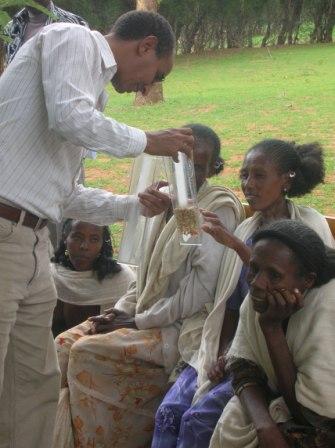A Risky Business, Now a Little Safer

If you’ve ever eaten a meal at a traditional Ethiopian restaurant, as I did last weekend (thanks, Addis Red Sea!), you’ve tried teff. It’s the grain used to make injera, the spongy, slightly sour bread that serves as both plate and utensil for your food.
Oddly enough, a couple of days later I heard about teff again at work–or, to be exact, teff farmers, in the village of Adi Ha, in Tigray, Ethiopia.
Newsweek just came out with Issues 2009, a guide for President-elect Obama to tackle those few, minor problems that the world faces this year. Among the solutions is a new Oxfam project, developed in partnership with a private company and a research institute, which could serve as a model for helping poor people survive climate change.
It starts in Adi Ha, where forty percent of households rely on their income from teff, a staple grain in Ethiopia. But recent rises in temperature and decreases in rainfall, striking a region already prone to drought, have made it hard for these farmers to harvest a good crop.
Agriculture is, by nature, a risky way to make a living. Drought, blight, and other factors can wipe out a season’s work in the blink of an eye. I imagine it must be hard to keep going when the odds are stacked against you due to factors outside of your control.
That’s where the pilot project comes in. It’s exploring ways to reduce the farmers’ risks from crop failure by offering “weather insurance” that protects their incomes, as well as techniques to improve the data on local rainfall, the quality of the soil, and the processing of the grain.
While Oxfam will manage the project and makes sure it works for our local partners, the reinsurance company Swiss Re (which developed a similar project in India) will provide consulting support and advice on risk transfer issues. The International Research Institute for Climate and Society at Columbia University will contribute technical support.
Swiss Re’s Raj Singh says these types of partnerships should be the wave of the future.
“It has become increasingly clear that the developing world will face some of the greatest challenges,” he writes of global warming. “[But] we cannot deliver solutions through the same channels that would be used in the United States and Europe. Establishing a strong network of partnerships involving the private sector, local government and nonprofit organizations will be essential.”
Sounds like a safe bet for the year ahead.